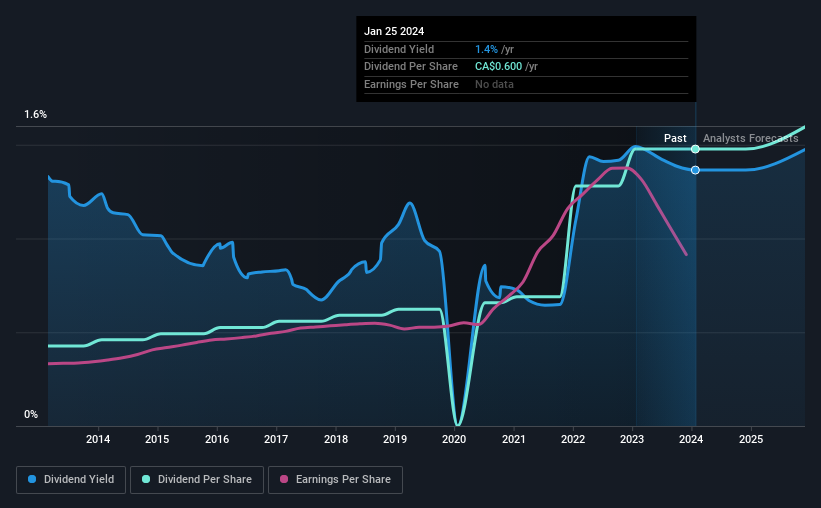Here's What We Like About Richelieu Hardware's (TSE:RCH) Upcoming Dividend
Readers hoping to buy Richelieu Hardware Ltd. (TSE:RCH) for its dividend will need to make their move shortly, as the stock is about to trade ex-dividend. Typically, the ex-dividend date is one business day before the record date which is the date on which a company determines the shareholders eligible to receive a dividend. The ex-dividend date is of consequence because whenever a stock is bought or sold, the trade takes at least two business day to settle. This means that investors who purchase Richelieu Hardware's shares on or after the 31st of January will not receive the dividend, which will be paid on the 15th of February.
The company's next dividend payment will be CA$0.15 per share. Last year, in total, the company distributed CA$0.60 to shareholders. Calculating the last year's worth of payments shows that Richelieu Hardware has a trailing yield of 1.4% on the current share price of CA$43.96. Dividends are an important source of income to many shareholders, but the health of the business is crucial to maintaining those dividends. So we need to check whether the dividend payments are covered, and if earnings are growing.
See our latest analysis for Richelieu Hardware
If a company pays out more in dividends than it earned, then the dividend might become unsustainable - hardly an ideal situation. Richelieu Hardware paid out a comfortable 30% of its profit last year. A useful secondary check can be to evaluate whether Richelieu Hardware generated enough free cash flow to afford its dividend. Luckily it paid out just 15% of its free cash flow last year.
It's positive to see that Richelieu Hardware's dividend is covered by both profits and cash flow, since this is generally a sign that the dividend is sustainable, and a lower payout ratio usually suggests a greater margin of safety before the dividend gets cut.
Click here to see the company's payout ratio, plus analyst estimates of its future dividends.
Have Earnings And Dividends Been Growing?
Companies with consistently growing earnings per share generally make the best dividend stocks, as they usually find it easier to grow dividends per share. If business enters a downturn and the dividend is cut, the company could see its value fall precipitously. Fortunately for readers, Richelieu Hardware's earnings per share have been growing at 11% a year for the past five years. Earnings per share have been growing rapidly and the company is retaining a majority of its earnings within the business. Fast-growing businesses that are reinvesting heavily are enticing from a dividend perspective, especially since they can often increase the payout ratio later.
The main way most investors will assess a company's dividend prospects is by checking the historical rate of dividend growth. Richelieu Hardware has delivered an average of 13% per year annual increase in its dividend, based on the past 10 years of dividend payments. Both per-share earnings and dividends have both been growing rapidly in recent times, which is great to see.
The Bottom Line
Has Richelieu Hardware got what it takes to maintain its dividend payments? Richelieu Hardware has grown its earnings per share while simultaneously reinvesting in the business. Unfortunately it's cut the dividend at least once in the past 10 years, but the conservative payout ratio makes the current dividend look sustainable. It's a promising combination that should mark this company worthy of closer attention.
While it's tempting to invest in Richelieu Hardware for the dividends alone, you should always be mindful of the risks involved. To help with this, we've discovered 1 warning sign for Richelieu Hardware that you should be aware of before investing in their shares.
A common investing mistake is buying the first interesting stock you see. Here you can find a full list of high-yield dividend stocks.
Have feedback on this article? Concerned about the content? Get in touch with us directly. Alternatively, email editorial-team (at) simplywallst.com.
This article by Simply Wall St is general in nature. We provide commentary based on historical data and analyst forecasts only using an unbiased methodology and our articles are not intended to be financial advice. It does not constitute a recommendation to buy or sell any stock, and does not take account of your objectives, or your financial situation. We aim to bring you long-term focused analysis driven by fundamental data. Note that our analysis may not factor in the latest price-sensitive company announcements or qualitative material. Simply Wall St has no position in any stocks mentioned.

